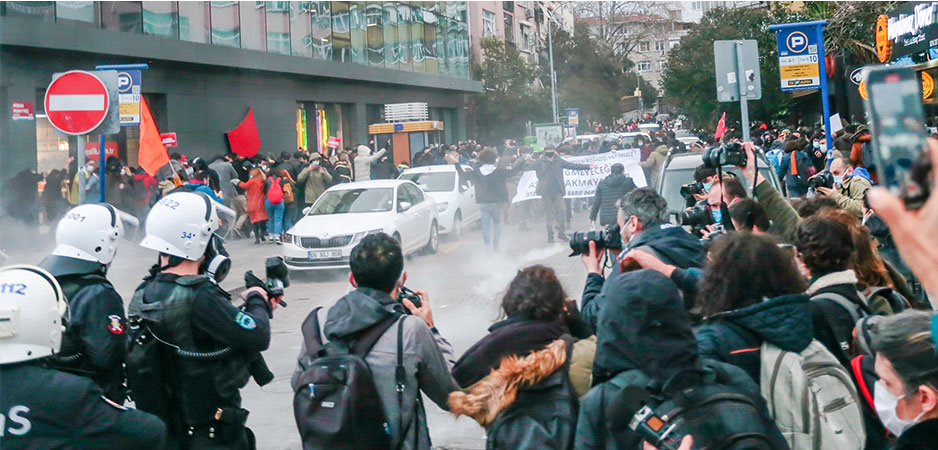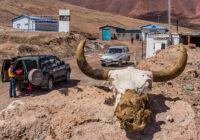Since January 4, Istanbul’s prestigious and politically liberal Bogazici University has been gripped by student unrest. The protests were initially provoked by Turkish President Recep Tayyip Erdogan’s decision to appoint a member of his Justice and Development Party (AKP) as rector. The government has responded harshly, detaining students, raiding homes, criminalizing protesters and their supporters as “terrorists,” and vilifying the university and its students as deviants from the “nation’s true values.”
Condemnation was not limited to the government: On February 7, Alaattin Cakıcı, an organized-crime boss and a former member of the ultranationalist Grey Wolves, tweeted a hand-written note stating the protests aimed to “harm the state and the People’s Alliance [AKP/MHP], which is the guarantor of our state.”
The US Will Need Turkey to Counter Russia
This episode of interference in the university’s administration is not an isolated incident. Under the state of emergency decree of October 2016, all rectors at public universities are now selected directly or indirectly by the president’s office, in conjunction with the Turkish Higher Education Council. The extensive purges that followed the 2016 coup attempt have created opportunities for the president to distribute academic posts to his supporters. Erdogan also regards the universities as central pillars of the “nation’s cultural hegemony.”
Ramping Up Repression
The attack goes beyond the universities, however. Ankara is determined to suppress all opposition. About 90% of the country’s media outlets are linked to the AKP through personal and/or financial ties. Prosecution of social media users for insulting the president is common. A new law from 2020 permits multiple bar associations, aiming to create an institutional wedge between pro-government and opposition lawyers. Ankara has also expanded its oversight over civil society organizations and worked to rein in local governments by replacing elected mayors in Kurdish municipalities with government-appointed trustees, cutting funding for opposition-held councils. It also works to contain civil society through prosecution, police violence, propaganda and, recently, even open support from mafia figures. The aim is to create a political community of supporters operating as agents of regime control.
In reality, the AKP is far from achieving cultural hegemony, as Erdogan himself admitted last year. In fact, popular discontent is growing. The pandemic has exacerbated Turkey’s already mounting economic woes and limited the AKP’s ability to redistribute resources to its supporters. Big business is complaining, while many small and micro-businesses are in debt. The official figure for youth unemployment reached 25.4% last November. Even AKP supporters are not immune to discontent over the rising cost of living.
The unexpected success of opposition parties in the 2019 local elections and their united front against the presidential system further complicate the picture. The government’s divide-and-rule tactics have so far failed to bring opposition actors fully into line. Moreover, tensions and cracks within the ruling alliance are increasingly visible. For all these reasons, Ankara is in attack mode and on the defensive at the same time, which explains its disproportionate reaction to the Bogazici protests. It is no coincidence that government officials and pro-government journalists have consistently compared them to the Gezi protests of 2013 to which the AKP responded with similar criminalization, vilification and repression.
The ghosts of the Gezi protests continue to haunt Ankara. One stark manifestation of this is the Kafkaesque trial of Osman Kavala, a Turkish businessman and human rights defender who was detained in 2017. The charges included “attempting to change the constitutional order and to overthrow the government” by leading and financing the Gezi protests. A second wave of arrests followed in 2018 for alleged links to Kavala. While the Gezi defendants were acquitted in February 2020, an appeals court overturned the acquittals of nine in January 2021. On February 5, the court rejected a request for Kavala’s release and merged the cases against him. On the same day, Erdoğan accused Ayse Bugra, a retired faculty member of Bogazici University who happens to be married to Osman Kavala, of being “among the provocateurs” of the student protests.
Europe Should Not Turn a Blind Eye
Europe should voice stronger criticism of Ankara’s repression of its citizens. While first and foremost a matter of principle, calling Ankara out is also in the EU’s own interests. While European policymakers have often enough prioritized stability over democracy in relations with authoritarian states, in Turkey’s case, that logic is associated with two problems. For one, it is unclear whether an authoritarian but stable Turkey would cooperate harmoniously with the EU. Even more importantly, the stability of authoritarianism in Turkey is uncertain for several reasons.
Firstly, Turkey’s economic capacity depends heavily on popular consent, in particular because the country lacks the kind of natural resources that can be exploited through coercion. Secondly, the country’s sociopolitical diversity makes it difficult for the AKP to thoroughly penetrate the civil sphere, making future protests highly likely. Finally, the personalization of power and the tensions within the ruling alliance make the government vulnerable. While the EU certainly cannot force Turkey to democratize, it can and should hold Ankara more accountable, especially at a time when it is turning to the EU for economic support.
*[This article was originally published by the German Institute for International and Security Affairs (SWP), which advises the German government and Bundestag on all questions related to foreign and security policy.]
The views expressed in this article are the author’s own and do not necessarily reflect Fair Observer’s editorial policy.
Support Fair Observer
We rely on your support for our independence, diversity and quality.
For more than 10 years, Fair Observer has been free, fair and independent. No billionaire owns us, no advertisers control us. We are a reader-supported nonprofit. Unlike many other publications, we keep our content free for readers regardless of where they live or whether they can afford to pay. We have no paywalls and no ads.
In the post-truth era of fake news, echo chambers and filter bubbles, we publish a plurality of perspectives from around the world. Anyone can publish with us, but everyone goes through a rigorous editorial process. So, you get fact-checked, well-reasoned content instead of noise.
We publish 2,500+ voices from 90+ countries. We also conduct education and training programs
on subjects ranging from digital media and journalism to writing and critical thinking. This
doesn’t come cheap. Servers, editors, trainers and web developers cost
money.
Please consider supporting us on a regular basis as a recurring donor or a
sustaining member.
Will you support FO’s journalism?
We rely on your support for our independence, diversity and quality.






